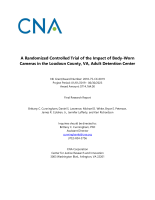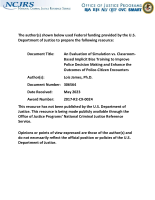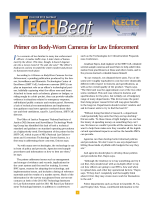Body-worn cameras
Results from an effectiveness evaluation of anti-bias training on police behavior and public perceptions of discrimination
Can body-worn cameras reduce injuries during response-to-resistance events in a jail setting? Results from a randomized controlled trial
A randomized controlled trial of Co-response for Mental Health Calls for Service to the Police in Fort Collins, CO
Policing Leadership and Accountability: Harnessing Big Data and Causal Inference for Evaluating Police Reform Practices
Exploring Officer Patrol Behaviors Using Automated Vehicle Locator and Body-Worn Camera Data in Kansas City, Missouri
A Randomized Controlled Trial of the Impact of Body-Worn Cameras in the Loudoun County, VA, Adult Detention Center
De-escalation Training: What Works, Implementation Lessons, and Taking It to Scale; Plenary at the 2023 NIJ Research Conference
Police use of force, while infrequently used, is a tremendous concern to public safety in the United States when officers employ it excessively or inappropriately, causing injury or death and eroding public trust in law enforcement. This plenary from the 2023 NIJ Research Conference describes the Integrating, Communications, Assessment, and Tactics (ICAT) de-escalation training program developed by the Police Executive Research Forum to guide officers in defusing critical incidents.
See the YouTube Terms of Service and Google Privacy Policy
Meeting People Where They Are to Improve Institutional Culture
Incarcerated individuals deserve opportunities for healing and growth, but they often lack the necessary resources for such opportunities. Additionally, organizational cultures that don’t support these outcomes often stand in the way. Researchers and practitioners gathered at NIJ’s 2023 National Research Conference to share ideas and projects that will increase opportunities for incarcerated populations around the country. This show continues their conversation.







